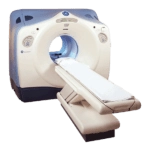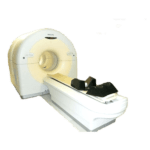The GE Discovery IQ Gen 2 16 Slice PET/CT Scanner is designed for diagnostic purposes, aiding in the detection of various diseases.

GE Discovery IQ Gen 2 Overview
The GE Discovery IQ Gen 2 16 Slice PET/CT Scanner is a sophisticated medical imaging device that integrates Positron Emission Tomography (PET) and Computed Tomography (CT) technologies. This hybrid system is designed to provide high-quality images and accurate diagnostic information, aiding in the detection, diagnosis, and monitoring of diseases, particularly cancer.
The GE Discovery IQ Gen 2 high image quality, diagnostic accuracy, and efficient workflow make it an invaluable tool in modern medical imaging. The scanner’s innovative features and patient-centric design ensure improved patient outcomes and comfort, solidifying its role as a crucial asset in disease diagnosis and management.
Benefits:
High Image Quality: Combines the functional imaging of PET with the anatomical detail of CT, providing comprehensive diagnostic information.
Enhanced Diagnostic Accuracy: Allows for precise localization and characterization of lesions.
Improved Patient Outcomes: Early and accurate detection of diseases can lead to better treatment planning and outcomes.
Efficiency: Faster scan times and reduced need for repeat scans increase patient throughput and reduce overall scanning costs.
Patient Comfort: Shorter scan times and a more comfortable scanning process improve the patient experience.
Features:
16-Slice CT Scanner: Provides high-resolution anatomical imaging, enhancing the overall diagnostic capability.
Advanced PET Technology: Delivers high sensitivity and resolution for better detection of small lesions.
Q.Clear Technology: Offers consistent and accurate quantification, improving diagnostic confidence.
Motion Correction: Reduces artifacts caused by patient movement, leading to clearer images.
Smart Design: Ergonomically designed for both patients and operators, facilitating ease of use and patient comfort.
Time-of-Flight (TOF) Capability: Enhances image quality by improving signal-to-noise ratio, especially in larger patients.




